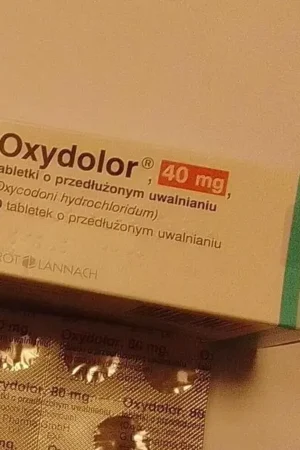Description
Oxydolor Oxycodone hydrochloride 40mg
Oxydolor Oxycodone hydrochloride 40mg and prolonged-release tablets are approved for treating moderate to severe pain including steady pain, e.g., cancer pain, paroxysmal spontaneous pain, and allodynia. This prolonged-release oral formulation of Oxydolor hydrochloride is indicated for managing moderate to severe pain when a continuous, around-the-clock analgesic is needed for an extended period. Oxydolor HYDROCHLORIDE prolonged-release tablet (Oxydolor) is not intended as a prn analgesic. Physicians should individualize treatment in every case, initiating therapy at the appropriate point along a progression from non-opioid analgesics, such as non-steroidal anti-inflammatory drugs and acetaminophen to opioids, in a plan of pain management such as outlined by the World Health Organization.
Composition of the preparation
The active substance and excipients contained in the core are the same in all Oxydolor doses, while the composition of the shell is different for each dose.
Oxydolor prolonged-release tablets contain 5 mg, 10 mg, 20 mg, 40 mg or 80 mg of oxycodone hydrochloride, respectively.
The excipients in the tablet core are: kollidon SR (polyvinyl acetate, povidone (K=27.0 – 32.4), sodium laurilsulfate, silica), microcrystalline cellulose, colloidal anhydrous silica and magnesium stearate.
5 mg tablet coating: polyvinyl alcohol, talc (E553b), titanium dioxide (E171), macrogol 3350, soya lecithin (E322), iron oxide yellow (E172), iron oxide black (E172), indigo carmine (E132) , lacquer
10 mg tablet coating: polyvinyl alcohol, talc (E 553b), titanium dioxide (E171), macrogol 3350, soya lecithin (E 322).
20 mg tablet coating: polyvinyl alcohol, talc (E553b), titanium dioxide (E171), macrogol 3350, soya lecithin (E322), yellow iron oxide (E172), black iron oxide (E172), red iron oxide (E172). ).
40 mg tablet coating: polyvinyl alcohol, talc (E553b), titanium dioxide (E171), macrogol 3350, soya lecithin (E322), yellow iron oxide (E172), black iron oxide (E172), red iron oxide (E172). ).
80 mg tablet coating: polyvinyl alcohol, talc (E553b), titanium dioxide (E171), macrogol 3350, soya lecithin (E322), iron oxide yellow (E172), iron oxide black (E172), indigo carmine (E132) , lacquer
Oxycolor side effects
Like any drug, Oxydolor can cause side effects. Among the most commonly observed are headaches, dizziness, drowsiness, vomiting, constipation, nausea, and itching. In addition, there have also been cases of eating disorders, ranging from decreased appetite, even to anorexia, behavioral disorders such as confusion, anxiety, depression, nervousness, abnormal thinking processes.
Some patients also complained of tremors, shortness of breath, dry mouth or low blood pressure, weakness or increased sweating. Hypersensitivity, agitation, emotional instability, decreased libido , hallucinations, memory problems, hypertonia, and the syndrome of inappropriate secretion of antidiuretic hormone were also much less common. The use of high doses of opioid-based drugs, especially over a long period of time, may be associated with the risk of addiction.
When should you not use Oxydolor prolonged-release tablets?
Hypersensitivity to any ingredient of the preparation, soy or peanuts, severe respiratory failure with hypoxia of organs and tissues and/or hypercapnia, hypercapnia, severe COPD, cor pulmonale syndrome, severe bronchial asthma, paralytic intestinal obstruction, acute abdominal syndrome, delayed gastric emptying, period breastfeeding.






Reviews
There are no reviews yet.